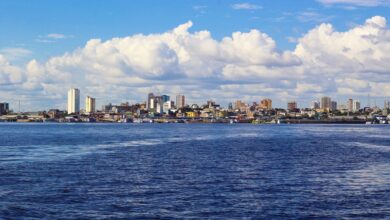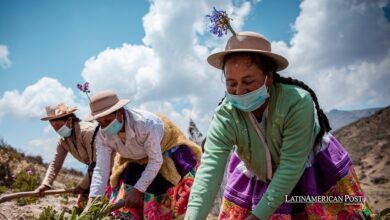Regenerative Agriculture, Key to Reducing Greenhouse Gas Emissions
PepsiCo's efforts are particularly noteworthy as the agriculture sector is responsible for a substantial 24% of global greenhouse gas emissions. Agriculture, a sector that utilizes a staggering 70% of the world's freshwater, is poised for a potential increase in production by up to 14% in the forthcoming years, according to data referenced by the company.

Photo: EFE/José Méndez
EFE
Escucha este artículo
Leer en español: Agricultura regenerativa, clave para reducir las emisiones de gases de efecto invernadero
Food industry companies in Latin America are driving regenerative agricultural practices to help reduce greenhouse gas emissions from agriculture, which account for 24% of global emissions.
In World Energy Saving Day and World Day Against Climate Change, celebrated on October 21st and 24th, respectively, PepsiCo announced that it will use these initiatives on nearly 100% of the land farmers use to cultivate and supply the American company worldwide.
In this regard, the goal of the beverage and food production and marketing company is to adopt regenerative agricultural practices on 2.8 million hectares, with agriculture as the starting point for efforts to counter environmental damage.
Reduction of greenhouse gases
The company's efforts are significant, as 24% of global greenhouse gas emissions come from agriculture, the same activity that uses 70% of the world's fresh water and is projected to increase its production by up to 14% in the coming years, according to data cited by the company.
Latin America alone produces food for 1.3 billion people, equivalent to one in every six inhabitants.
In this regard, by 2031, 18% of global food exports are expected to come from the Latin American region.
Also read: Brazil: New Project To Mitigate Polluting Gases From Cows
Regenerative practices
Among the regenerative agricultural practices promoted by PepsiCo Latin America are efficient water use, soil conservation actions, the use of high-tech, low-carbon footprint fertilizers, and technology to reduce the carbon footprint in agriculture.
The company has also managed to reduce its greenhouse gas emissions from potato cultivation, one of its most essential ingredients, achieving a 27% reduction in these gases between 2015 and 2022.
PepsiCo Latin America, with whom EFE maintains a content dissemination agreement, has also indicated that it is working to achieve these results in wheat cultivation in the region by promoting the Sustainable Agriculture Bajío (Agriba Sustentable) program, in collaboration with the Trimex Group and the International Maize and Wheat Improvement Center (CIMMYT).
This project aims to promote the adoption of regenerative agricultural practices among wheat producers in the Bajío region of Mexico, located in the Mexican states of Guanajuato and Michoacán, critical suppliers of Gamesa products, a PepsiCo satellite brand.
Results
From August 2022 to July 2023, Agriba Sustentable provided benefits to more than 289 producers through 379 plots, resulting in a positive impact on a total of 4,936 hectares in the Bajío region, with an average savings of 37% in production costs per hectare.
Likewise, adopting regenerative agricultural techniques resulted in a 34.5% reduction in greenhouse gas emissions, a 23% decrease in fuel consumption, and a 7% reduction in water use for each kilogram of wheat produced.




